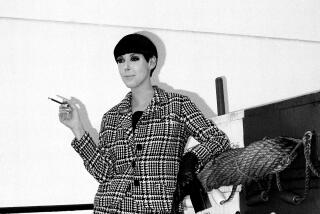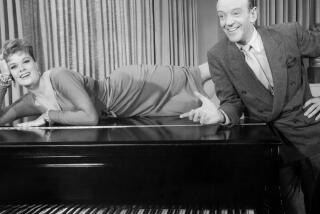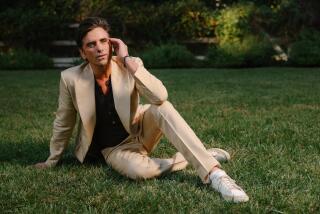My father was a cowboy. He had...
- Share via
My father was a cowboy. He had been a cowboy for about 15 years, but he came to San Diego during the first world war to work for the Army. The armistice came right after I was born, and we moved on to Los Angeles, where he became a stunt rider and double for Tom Mix, the famous cowboy star.
While my father was working, my mother just happened to visit another studio with a friend, and I was accidentally discovered there. I was 20 months old. I went to work at that studio making two-reel comedies.
The name was given to me by the studio. I was born Peggy Jean, and when they called my mother to ask me to come to work, they said, will you please bring Baby Peggy, and the name just stuck.
My first film was “Playmates,” and I co-starred with Brownie, the wonder dog. He was world-famous and full of marvelous tricks.
In the early days, there just wasn’t much of a script. We had what we called a gag man. He thought up situations and gags, and we just sort of spun it out during the day.
My father was strict with me. I was never promised ice cream if I did this. It was strictly business. I learned very early to earn the respect of my peers. And adults were my peers--the crew, the director, the actors--so I didn’t ever have the feeling I was a little girl.
School was very sketchy. We did have tutors on the set, but as usual, the time that was supposed to be set aside for schooling, two to three hours a day, was always scrapped in favor of the shooting schedule. I was lucky I was tutored by a lady who was a dean at a college.
When I was little, I had a great sense of responsibility. I enjoyed my work, I liked making films because it was a challenge. My biggest difficulties were the problems that my fame caused. It created problems in my parents’ relationship.
My father took me to the studio all the time, and the way he would get my mother’s approval was through what he could accomplish through me, like a new contract.
And my sister and I got along very well, but she had a lot of difficulty because she was shoved in the background in spite of the fact my parents made every effort to make her feel equal. The fame and attention I got was so overwhelming, it was hard for her to overcome.
I left films when I was 6 1/2 and went on stage. Then I was in vaudeville until I was 10 years old. I had another incarnation when we left Hollywood and my father bought a ranch in Wyoming. It was wonderful. It gave me a degree of privacy which I never had. Those were my happiest childhood years.
We had a 1,500-acre ranch, and I had an immense amount of freedom. We spent four years on that ranch. It was very isolated. No lights, no water. It was like going back to the 19th Century. I came back to Hollywood when I was 14, back to films, to recapture the childhood fame, which I never did. I didn’t think I ever would. My parents believed I could do it, but I never had my heart in it.
Every performing child star has this problem. When they reach adolescence, the usual transition, which is bad enough for any child, is compounded by an identity crisis. It’s not always successful for a child to make the transition because the image of the child is so strong that the industry doesn’t want the adult in you to supersede.
I got married when I was 20, but it was not particularly successful because my husband was still in show business. I should probably have never married someone in show business, since I was preparing to leave it. We lasted nine years. I remarried in my 30s, and we have been happily married ever since. We have a son and have had an extremely happy life.
I’ve been a free-lance writer for 30 years now. I changed my name after I was married for writing purposes.
Every time I was introduced at a party, anywhere, the minute people said “Peggy,” people recognized me because I still looked very much like I had. I became so tired of explaining whatever happened to me, to my career, to the money.
More to Read
Only good movies
Get the Indie Focus newsletter, Mark Olsen's weekly guide to the world of cinema.
You may occasionally receive promotional content from the Los Angeles Times.









